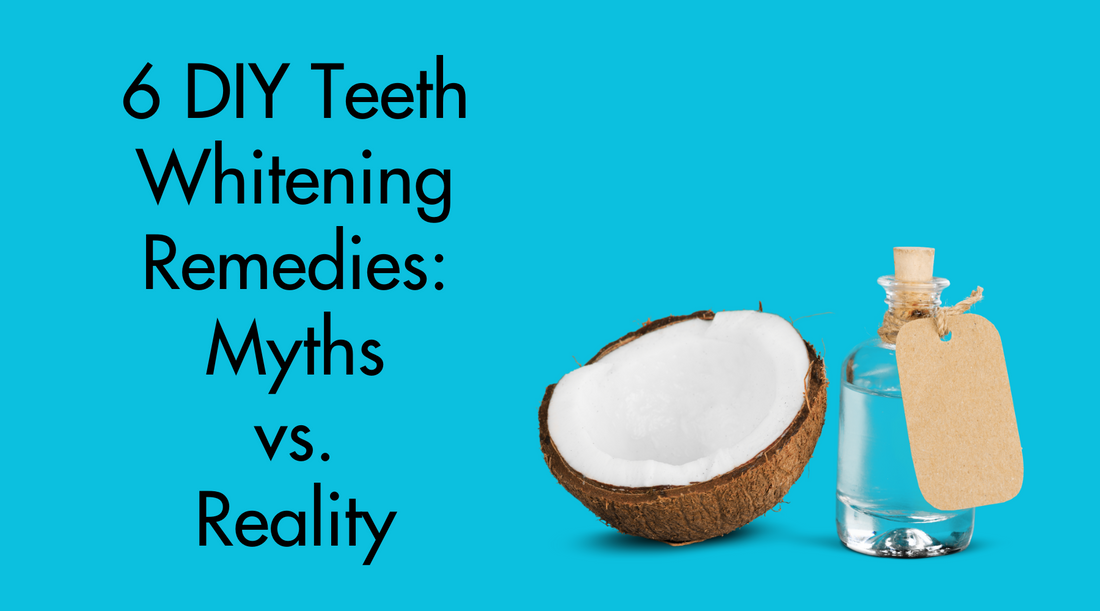
6 DIY Teeth Whitening Remedies: Myths vs. Reality
Share
A bright, confident smile can significantly boost one's self-esteem.
With the increasing popularity of DIY teeth whitening remedies, many people are seeking cost-effective and accessible ways to achieve a whiter smile.
However, it is essential to separate fact from fiction when it comes to teeth whitening.
In this article, we will debunk six common DIY teeth whitening remedies, explaining what they are, how they are applied, why they do not work, and in some cases, why they are very dangerous to the longevity of your natural smile.
Lemon Juice and Baking Soda
Lemon juice and baking soda are popular ingredients in various DIY teeth whitening recipes.
The idea is that the citric acid in lemon juice and the abrasive nature of baking soda will remove stains from teeth.
However, this remedy is potentially harmful to dental health. Lemon juice's high acidity can erode tooth enamel, making teeth more susceptible to sensitivity and decay.
Additionally, the abrasive nature of baking soda can also wear down enamel and lead to irreversible damage.
Activated Charcoal
Activated charcoal has gained popularity as a natural teeth whitening remedy.
Advocates claim that charcoal absorbs stains and toxins, leading to a whiter smile.
However, there is little evidence to support these claims. In reality, activated charcoal's abrasiveness can damage tooth enamel, leading to long-term dental problems.
When activated charcoal is brushed on to the teeth and gums, it temporarily darkens the gums, making the teeth appear to be brighter, even though they are not. :/
Moreover, its effectiveness in removing stains is questionable, and regular use may result in tooth sensitivity and gum irritation.
Coconut Oil Whitening
Coconut oil pulling involves swishing coconut oil around the mouth for an extended period, with the belief that it will remove stains and promote oral health.
While oil pulling may offer some minor benefits like reducing bacteria in the mouth, it is not a reliable teeth whitening solution.
Coconut oil whitening strips and coconut oil whitening pens have zero effect on the whiteness of your teeth, and in the event that you are seeing influencers promoting these products, buyer beware.
Allow us to repeat that - COCONUT OIL DOES NOT WHITEN TEETH!
Any potential stain removal is limited, and it cannot address deeper discoloration.
If you want dental-level whitening from home, a home whitening kit or whitestrips remain the most effective option for significant whitening results.
Apple Cider Vinegar Rinse
Apple cider vinegar (ACV) is touted for its health benefits, but as a teeth whitening remedy, it falls short.
ACV's acidity can erode enamel, leading to sensitivity and an increased risk of cavities.
Furthermore, it lacks the necessary whitening agents to make any substantial difference in tooth color.
Instead of using ACV, consider an easy-to-use home whitening kit with teeth whitening gel that is used by dentists, like our White in Minutes Home Teeth Whitening Kit.
Strawberry and Baking Soda Paste
The combination of strawberries and baking soda is believed to be a natural way to whiten teeth.
Strawberries contain malic acid, which some think helps remove stains, while baking soda acts as an abrasive agent.
However, like other DIY remedies, this paste is not recommended. The malic acid, coupled with the abrasive texture, can weaken enamel and lead to irreversible damage.
Instead, opt for safe teeth whitening options, such as professional dental treatments or a home whitening treatment.
Hydrogen Peroxide Rinse
Hydrogen peroxide is an active ingredient in many commercial teeth whitening products.
Some DIY enthusiasts suggest using it as a mouthwash to achieve similar results.
While hydrogen peroxide can remove surface stains, it is crucial to use it cautiously and in appropriate concentrations.
DIY solutions are often too strong and can damage gum tissues and tooth enamel, leading to adverse effects on oral health.
White in Minutes teeth whitening gels are specially formulated with concentration levels that do not harm the enamel and delivery whitening results safely.
Conclusion
While the allure of DIY teeth whitening remedies is undeniable, their effectiveness is questionable, and their potential harm to oral health cannot be ignored.
Lemon juice, baking soda, activated charcoal, coconut oil pulling, apple cider vinegar, strawberries, and hydrogen peroxide are not recommended as teeth whitening solutions due to their potential risks and limited results.
For a safe and effective teeth whitening experience, contact us for a detailed breakdown of our phone whitening products so we can guide you in selecting the appropriate whitening treatments tailored to your needs.
Remember, a healthy and beautiful smile starts with proper dental care and regular visits to your dentist.
